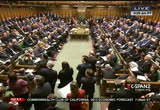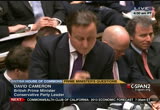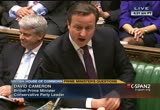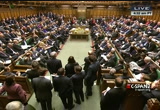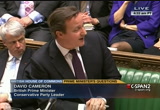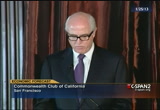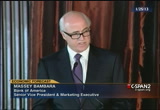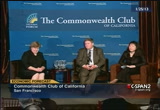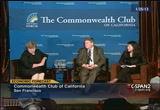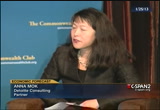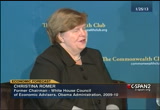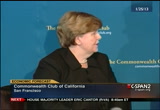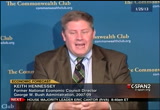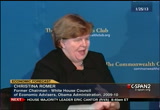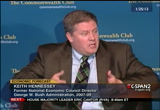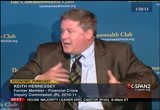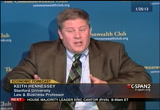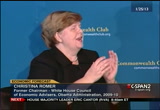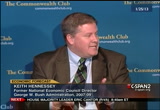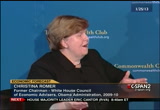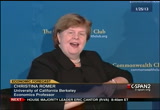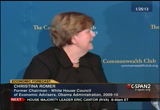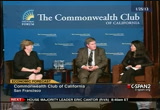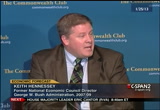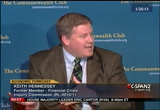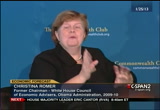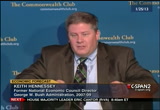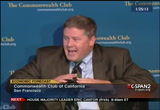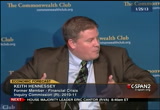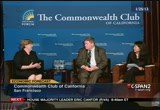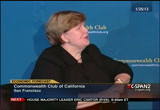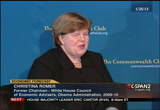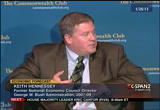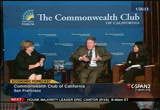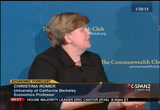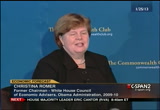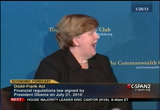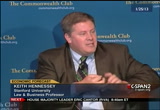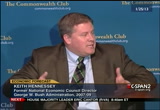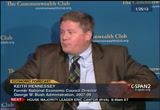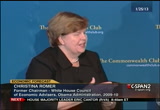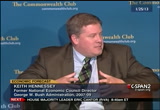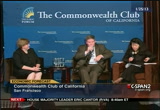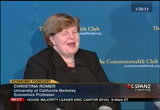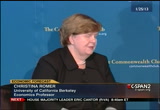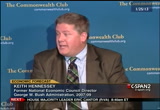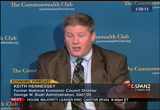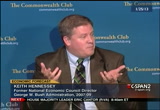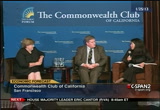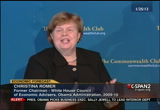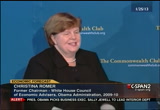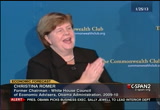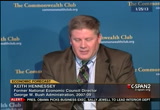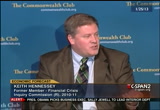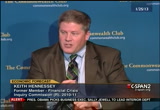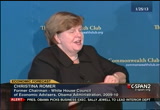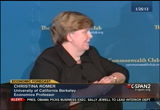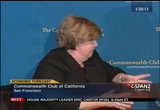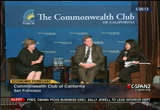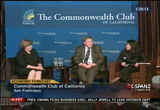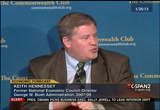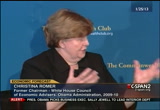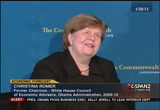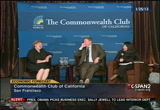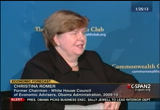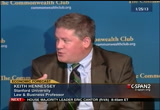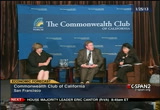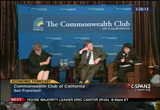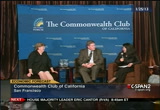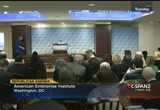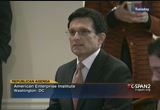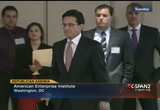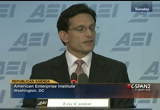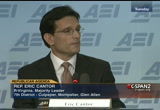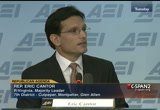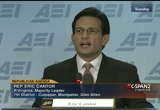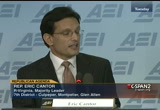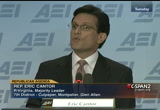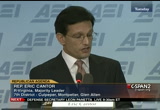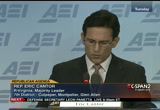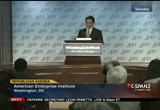tv Today in Washington CSPAN February 6, 2013 7:30am-9:00am EST
7:30 am
forward. >> four years, young people have -- [inaudible] this is now becoming critical. can the prime minister look closely at notches the authorities that specifically the low level of people -- [inaudible] >> i will look closely at what my honorable friend has said. i would make a couple of points. one is that within the education budget we have prioritized the per pupil funding so that has been a reduction in per pupil funding because i think it's very important schools can see forward to future years, the source -- a source of budget they will have. the second thing we've done is obviously for the academy program is to encourage the devolution of more of the schools budget to the schools directly and i still think there's more that we can achieve on that agenda. >> mr. speaker, the prime minister said he would give the
7:31 am
public a strong voice in the nhs. his former health secretary said he would have since of the nhs. why then -- [inaudible] rejected by the government last night? >> we do want to see patients have a stronger voice in the nhs and we are about to debate i think at some length some terms of the staff how that is done. i think one of the most important ways is going to be making sure that the mandates of the nhs commission board has at its heart quality nursing, or day care, and the voice of patients. we also need to look at how health watch is going to work to make sure it is truly independent and we have to understand that some of the ways we have tried to empower patients in the past and the report we're about to discuss goes into this in some detail, some of the ways always with good intentions from governments on both sides of the house to give patients a better voice, we have to listen to what friends says when he says it hasn't worked.
7:32 am
>> with more women in work than ever before, with more men in work than ever before, with more jobs created in the private sector, with the prime minister not agree with me that the chancellor's plan a is not only working with the economy is beginning to turn the corner? >> i'm grateful to my honorable friend. i think we should listen very carefully to what the governor of the bank of england said. we have said of course that growth is slower than we would like, but the economy is moving in the right direction. the rebalancing is taking place. the things that need to be fixed in our economy in terms of bank lending and housing supply, these things are being fixed. that's what this government is determined to do. >> one of my constituents has learned that when the bedroom tax is introduced she will have 24 pounds a week to live on. she is so anxious about how
7:33 am
she's going to manage. she is having cognitive behavior therapy. but her anxiety is totally understandable. does the prime minister agree with me that those who should be receiving the cognitive behavior therapy are the ones, namely his ministers, who think she could live on 24 pounds? >> i think the party opposite does have to address the fact that for 13 years in government they were perfectly content to have a housing benefit system for people who lived in private sector housing where there was no extra benefit for empty rooms. and i cannot understand why they count it unfair to have one rule for people who have the benefit of socializing with logan and another one for people in private sector accommodation. week after week the labour mps and the labour leader comes here of posing this benefit change, that benefit change, and everything we do to deal with the mess that they left. and then tell they can learn
7:34 am
that they have to take some of the responsible for the mess they left, no one will ever listen to them. >> order. statement the prime minister. >> here on c-span2 we will be the british house of commons now as they move onto other legislative business. you have been watching prime minister's question time aired live wednesdays at 7 a.m. eastern while parliament is in session. you can see this week week's qun time again sunday night at nine eastern and pacific on c-span. and for more information go to c-span.org and click on c-span series for prime ministers questions. plus links international news media and legislatures around the world. you can watch recent video, clinton programs dealing with other international issues.
7:35 am
>> the single thing that coolidge did that we want to remember is that when he left office the budget was lower than when he came in. that's the story for us now. how did he do that? the economy grew a long. may be more than 3% sometimes. the budget was balanced due to his own party money. how did he manage to keep the budget going lower, and how does that help the economy a lot. because he got the government out of the way of the economy. spectrum seven traces the life of the 40th president of the united states in coolidge, sunday night at eight on c-span's q&a.
7:36 am
>> at the banc of america's annual forecast, economists discuss the future of the u.s. economy. as well as health care, education and the federal budget. from a commonwealth club of california, this is just over an hour. >> good afternoon and welcome to today's meeting of the commonwealth club of california. i am massey bambara, president of bank of america, member of the commonwealth board of governors and chair of today's program the we welcome our listeners on greater and television and invite everyone to visit us on the internet at commonwealthclub.org. today we are pleased to present the walls -- annual economic forecast named in honor of the clubs late as president a longtime board member, doctor walter hoadley.
7:37 am
he also served most notably as chief economist and vice president of the banc of america. today's program is sponsored by the memorial fund and bank of america. today's program will feature two distinguished speakers with distinctive peoples. dr. christina romer, professor of economics at the university of california at berkeley, and former chair of president obama's council of economic advisers. and mr. kief hennessey who teaches at the stanford university graduate school of business at stanford law school, and served as director of the national economic council under president george w. bush. keith hennessey served as both director of the national economic council and as assistant to president bush for economic policy. as director of the national economic council during the 2000 a financial crisis, mr. hennessy was at the center of one of the most volatile times in american history. he was a senior white house economic adviser when he coordinated the design of the
7:38 am
president's policies on taxes, health care, pensions, energy, and financial markets and institutions, among others. mr. hennessy has spent more that 15 years in economic policy roles for senior elected officials. before his time in the white house who worked on capitol hill for more than seven years as economics advisers to former senate majority leader trent lott. since leaving the white house mr. hennessy has been a television commentator, one of the top 25 economic blogs by "the wall street journal." he also served as a member of the financial crisis inquiry commission. mr. hennessy holds an undergraduate degree from stanford and masters degree in public policy from harvard university's kennedy school of government. as chair of president obama's council of economic advisers from january 2009 until september 2010, dr. christina romer was one of the for economics principals who met with president obama daily to
7:39 am
design and guide the administration's response to the great recession. dr. romer played a key role in the administration's macroeconomic policy, reform of the financial system, health care reform, and budget policy. an expert in economic history and macroeconomics, dr. romer is a leading scholar on the causes of the great depression and the impact of monetary and fiscal policies. in addition to her current role, as the class of 1957 wilson professor of economics, ma she is also codirector of the program in monetary economics at the nashville of economics research. dr. romer is a regular contributor to "the new york times" economic view column and a contributing editor for bloomberg television. dr. romer holds an undergraduate degree from the college of william and mary, and a ph.d from the massachusetts institute of technology. today, dr. romer and mr. hennessy will be in conversation with the vice chair of the commonwealth club board
7:40 am
of governors and partner at deloitte & touche. please welcome dr. christina romer, keith hennessey, and anna. [applause] >> thank you. thank you, massey, for your introduction. [inaudible] >> both dr. romer and mr. hennessy had to observation. you have someone who worked for republican president and another one who worked for democratic president to give stanford and cal. [laughter] spent they will share their views. hopefully that leads to a lot of enlightening conversation that we will have an also good questions and autistic so with that we'll start off with some of the defense of the week. we had earlier in the week and inauguration of president obama
7:41 am
for a second term. getting into obama, and clearly the view, there's a lot of questions on how he is doing and what the administration is going to do, given what's happened in the last election. dr. romer, share some views given that you've worked for the president. how is the administration doing? >> so, certainly what is true is that the american economy has been through a very rough five years, and president obama has been president for four those. so it was certainly a baptism by fire in terms of what he faced coming in. you know, i think the administration has taken some incredibly important view on policy but everything from the recovery act that he played a role in helping us to turn the corner, health care reform which i think is going to be very important going forward for the health of the economy, the financial records were reform, all those things. so i think he's accomplished a
7:42 am
great deal. unfortunaunfortuna tely there still a lot more to do, and i think the big issue looming, there's so many big issues. everything from immigration reform to gun control. we got a sense in his inaugural address of the two things that he definitely wants to tackle, but the one is not going to be able to of what is the fiscal situation. that we have a lot of foreseen events that have to happen between the debt ceiling at what am i going to do with the sequester, the money the government is spending that is supposed to be cut. those at issue is going to have to face and i think much more important is the very large, long run deficit that a thing all of us want our policymakers to come together and address how we're going to do with it. i think that's unfortunate will have to be front and center in the next year coming up with that. i sure hope it is. >> let's see, i think first thing just to mind ourselves out
7:43 am
is that the impact of it president on the short-term macro economy is almost always exaggerated. presidents can have a big impact on the economy in the medium term and long run, largely -- and while the fed has cut aid to help they can should have a much bigger short-term effect, we immediately looked to the white house and said what are you going to be about the economy right now? dr. romer and i would have to go on tv and there is points and talk about the job supports and what would happen over the course of the next month and the thing that is so frustrating note in fact not much that you were doing action has a direct result what will happen over the course of the next month. i think it is interesting how the debate has shifted. four years ago to talk about the economy, it was entirely about the short-term situation. now the economy is still hurting. it is growing slowly but it is clearly a heck of a lot healthier than it was four years ago.
7:44 am
and yet none of the discussion is about the short-term macro picture. it's entirely about the medium-term fiscal picture. and, unfortunately, i don't see us making any significant progress on that. frankly, anytime in the next two years but i think they are out of scale and i think it's sort of going to be ugly arguments that little progress will be coming. >> let me jump in for a second. you said you wanted us to debate. [laughter] i don't think the focus is all change to the medium-term deficit in fact the reason i think it's sort front and center is precisely because it has to be part of the discussion on jobs i do think the president cares deeply about the fact that we still have an unemployment rate just slightly below 80%, that is an unbelievable tragedy. i think realistically if you're going to do more infrastructure
7:45 am
spending or you're going to make the kind of investments we need to make in education, that might put people back to work now and make us more productive in the future, the only way you ever get congress to go along with you if you also say let's make this as part of a package to do with all those other long run things. i think it might begin with the medium-term fiscal situations, some sense is making face to do things you need to do now to get more short-term recovery. >> except that -- >> four, anna. >> know, that's good. >> look, to move the needle, if you're pulling the fiscal policy lever under kind of a short-term impact, you've got people pretty hard. president bush proposed and congress quickly enacted what we then called a fiscal stimulus bill, and on the right of the i'll it was not forbidden taxes
7:46 am
are the. it was a bipartisan bill. we have bipartisanship at the time but was $150 billion. it was 150 going to push to about 18 months. we figured that was probably at least the small size that we needed to move the needle on gdp. the obama folks came in. they did something significantly bigger, and they did that in part because the macro picture was far worse. the additional infrastructure spending and increase government spending that's been talked about right now was too small and too slow, if you buy into the idea that more government spending we give a short gdp term kicked for not doing enough of that. i'm skeptical. i wouldn't be doing that policy. but if you want to be the short-term kick, you've got to do something that is, i do want is an order of magnitude, but several times larger say in where going to increase highway spending by another $100 billion over the next few years isn't going to give you the short-term
7:47 am
kick. i also think it's infeasible to imagine that republican house, you're absolutely going to get significantly increase government spending in any context. but i think those are served to separate question but i think it is legislative and feasible and even if it were legislatively feasible i don't think it's big enough to move the gdp needle enough to make a significant impact. >> so what would make the needle moves? >> i don't think there is much. i don't think there's much in terms of actions. i won't surprise folks are. i am concerned about the drags that can send you -- to continue to be imposed on the private sector but i think that some of the uncertainty that we had, regulatory uncertainty, has been eliminated with the reelection of president obama. is now not to question whether the affordable care act moving forward but we know it's moving forward. we know there's not going to be an effort to repeal but now we're just left with the
7:48 am
uncertainty about how quickly are the states going to implement the exchanges, what is -- there is now no question that dodd-frank is not only the law but will stay in place released another couple of years. so at least that policy answered has been a limited us to is the question of how are all the regular agencies going to do that work is going to cause a drag. so i'm worried about policy drags. that shouldn't surprise anyone. >> we can come back to -- you were saying not possible to do enough infrastructure spending. but if you look across the atlantic to europe, exactly the opposite of a dramatic fiscal contraction. and i think that is at the heart of what we're trying to avoid with a sensible discussion about the budget deficit going forward. how do you make progress on that, how do you put spending in some key areas. but the most important, how do you avoid doing tremendous
7:49 am
amount of austerity say in 2015 or 2014 which would absolutely -- >> part of this is the old joke about you give someone a sentence and you say i worry most about the blank become and i will let the blank take care of itself. you have to fill in short-term and long-term. if you are left or right, we tend to often focus on different -- of ours. but we have is a short-term long-term trade off. which is the obama is seen increasing government spending by $860 billion. they made incitement that that was going to increase gdp in the short run. and then there's also to argue is about the counterfactual about how effective it actually was. but one thing that we know for certain is that it increased the budget deficit by $860 billion. and so there's a long-term costs. i think part of what's happened now, part of it is because the
7:50 am
economy is starting to heal itself and part of it is just a new policy focused on is there is more focus on the medium-term fiscal problems relative to a few years ago when it was all about what is the government going to do in what's going to happen right now spent and g2 that as positive? >> i am principally concerned -- i am more skeptical about the government's ability to reduce gdp in the short run and i tend to think there's often negative consequences of doing so. and i am very concerned about what we used to call the long-term fiscal problem, but we now call the medium-term fiscal problem. >> all, let me just say i care about both of them. i think any policymaker has to care about both the short run and how much are people suffering today in the long run. and i think they are often interrelated. so one of the things we afford to much about is is unemployed status i forgot long period of time, that tends to hurt unemployment into the future
7:51 am
because people lose their attachment to the labor force but and job skills. i think these two things are related. exactly what i was saying is i think, i think one of the places where the biggest disagreement is the long run budget deficit and that we have to take serious measures to get that in the control. but i think that's important not just for the long run but for today. i think it does increase confidence today. i think it does open up today to do good investments today. the other thing is in terms of what can government do, i think we should leave out the federal reserve because federal reserve, the one of the most positive elements i think over the last say, five months has been that the fed us would've woken up again. they were very active during the crisis, but kind of dialed back for a few years there, and starting in september i think starting to say okay, we're going to do more and try to be more helpful. i think we're seeing signs that i think it is very important.
7:52 am
>> one point on short term. and i'm not suggesting that dr. romer -- i've never heard her say. i do hear the argument frequently that because we still short-term economic weakness, we can't make changes to our medium-term fiscal policy. oh, gosh, you can't start to cut the entitlements that much because if you do we will begin the recovery and things will be really better and i think what that does is that's the mistake of conflating the dates for implementation versus the dates for agreement. you and i could reach agreement now on a deal to restructure entitlement spending program. and i'll tell you what. you can solve the medium-term and long-term fiscal picture, i will let you pick any start date you will. you can pick four years from now. you can pick five years from now. whatever date you want that gets you past the point where you're
7:53 am
concerned about the short-term impact. because if we're talking restructuring the entire programs i don't particularly care about the first few years so i'm willing to le let you pik that date so just take that argument off the table. but instead what happens is that a lot of folks left of center say we can't in fact even negotiate the agreement on the long-term solution until the economy has recovered. that's a false argument. >> i think interest, i think both of us actually would say i'm you know, i understand where he's coming from but i think both of us disagree with it. a sense, i think one of the most frightening thoughts is we will let the next generation do with a long-term budget deficit. the key thing is it gets harder the longer you put off dealing with it. so i am with you completely that making those decisions that i think is very important. i think where you differ from a lot of people on the right is
7:54 am
being very reasonable about when you face in. 's so much of the last couple of years is all been about we actually have to get the deficit down this year or we have to cut spending this year. and any vulnerable accounting -- economy i think it is dangerous but it's much report to make the hard decisions, to make your fiscal consolidation backloaded, to kicking gradually over time but i think that's absolute the right policy for an economy like we have that is still vulnerable. >> talking about some of the short-term decisions, talked a little bit about the fiscal cliff the early going to be able to pay our bills this year? that's been defined pay our bills speak of the federal -- were the federal government be able to honor our dead? >> so that's a question about the debt limit. i think so. i think the most likely scenario
7:55 am
is that a few months from now congress repeats what just it. which is there's a lot of huffing and puffing, and then i think they do another extension but i do think it's a long-term, a one year or two year extension. i think that six months or nine months extension, and i think the fiscal conservatives try to get some kind of concession on spending in exchange for the. and that's not ideal, but i think that's, that is probably the most likely scenario. i had an op-ed in the journal last week urging republican members to vote for an increase in the debt limit, but at the same time to be commanding that the budget process move forward and that we start to get some spending i think that as much as there is and increased liquidity risk from the short-term debt limit extension, we also have a tremendous solvency risk as a
7:56 am
fiscal matter, if you don't have a -- right now given the polarization in washington, by far the most likely snack is that nothing happens for four years in the medium-term deficit picture. if that's the case you've got to decide are you willing to live without. i'm sure there are factions within the greek government that would love nothing more than for the germans to just give him enough liquidity to go for five years and never check up on them. but, in fact, the creditor does into the, or if you're a creditor of a from that is gone bankrupt or going bankrupt. you say i'm going to give you money to keep you going for the next quarter or two and i want regular chickens and i want you to set metrics i want to see what you do. i look on the debt limit as the only tool that has been the conservatives have right now to try to create that accountability, because otherwise we just keep spending.
7:57 am
>> [inaudible] spent unless some rights as a deal occurs to cut spending by one or $2 trillion over the next decade and and i just can't see where the votes are to do that right now. >> the debt limit is such a strange thing. i think what about the only country in the world that we but once to spend the money and once on whether to pay the bill. that just doesn't make sense. i'm probably going to disagree with you here. we were talking earlier about an episode back in 2008 where the banks were in trouble, the bush administration had gone to congress and said listen, we need to put capital into banks. that aided the hard legislative he described of congress first turned down, then the stock market plummeted and congress it okay, we changed our mind. but i think that maybe part of what we are seeing on the debt ceiling is the last fight over the debt ceiling back in the summer of
7:58 am
2011 turned out to be a terrible self-inflicted wound for the american economy. we saw consumer confidence plummets, our debt got downgraded. i think that's part of why i think even republicans who care very much about spending are nervous to use as a bargaining chip again, precisely we saw how damaging bringing into question the credit worthiness of the american government was. so am hopeful that we won't keep fighting over this, that we'll have the right fight, which is what she' just any become whicho about the deficit, and not should we pay the bill. i think that's a terrible what. >> and there's a very interesting question about whether, in retrospect, whether republicans leveraging the debt limit in the summer of 2011 could get a bill that cut spending by one to $2 trillion going forward, whether, in fact, that was worth it. because what they did was they introduce liquidity rates by
7:59 am
saying hey, if you don't cut spending when not going to vote for a debt limit. and it works. and as a result they got the president to agree to cut government spending by a very significant amount. now, would you like that that negotiations had resulted from not having made the threat? absolutely. at the question is, do you think it actually would have occurred? and so there's a difference. i would never be one to advocate that congress should not increase the debt limit. i absolutely think they should, and when this came up in the summer of 2011 i wrote that and put it in a paper, the "national review" which is only read by the conservatives. and i was arguing against those who were saying look, let's start to create a cash flow fight, cash crunch. obsolete the wrong thing to do. but congress has the ability to decide what they attach to the debt limit, and i think it's
8:00 am
completely appropriate for congress to attach spending cuts. i use a metaphor, if your teenage kid, give your teenage kid a credit card and your kid goes and just blows through the credit card, you don't as some folks on the right were saying, you don't stop paying the credit card bill, you pay the bill because those obligations have already been occurred and you have a legal and moral obligation. .. i agree we have to pay the set, we have to pay the bill.
8:01 am
i think the idea that the only way you guys president obama and democrats in congress cut spending by threatening the credit worthiness of the u.s. government. i think it's not true. the one piece of inside information i'll give you, president obama cares about the deficit. if there's something that notice in the first two years when the economic crisis was had to be front and center, the thing he wanted to deal with is that long run deficit. the idea that he'll just go on a spending bing if you continue make threats like that is crazy. i think the evidence is there. he kept asking for them to be paired with tax increases as well. i think there's more good will, i guess, than i think people realize. and more agreements that we have got such a big budget problem that we're going have to be firing on all cylinders. we have to cut spending and reform the entitlement programs
8:02 am
and frankly, raise more revenue. i think it's the realistic situation when a problem is as big as we face. >> you're listening to the commonwealth club of california radio program. our speakers are noted economic experts mr. keith hennessey and doctor -- for doing national, global, and regional economics for 2013. you can find video of the commonwealth programs online. let talk about the series a questions of around the employment and job growth. -- [inaudible] >> well, i will start. i think, you know, i will say, i was here last year and i'm certainly more optimistic this year than last year. i think we have made a significant amount of progress, if you look it looks like housing prices have family started to turn the corner.
8:03 am
i think you if you lock at household balance sheets. the consumers have paid down the debt that was weighing on them. i think there's reasons to be optimistic. i think that, you know, that the dynamism i think we both embrace around the american market system is ready to kick in, take in, takeoff, however you want to describe it. it's fairly optimistic. i think we still have things weighing on us. i think the concern about are we going to shoot ourselves in the foot not raise the debt ceiling or not come an agreement on various things. i think it's one of the main things that could derail us. i'm still, i think, more nervous about europe than some people, precisely because interest rates are down and some of the most troubled companies. the -- countries the troubles are there. i don't think it's a problem that has gone away. i think we have a risk to the economy. unfortunately i don't see us
8:04 am
heading off to robust, fast recovery, i think, 2013 will be better than 2012. i wish i could tell you it would be great because that's what we need. >> i'm not a forecaster. i don't call myself an economist. i specialize in economic policy. i try to be a consume are of other fauxes. one thing i have learn trd that, frankly, i don't trust any macroforecast that goes beyond six months. i think they are guessing after that. i think i would have similar reactions. i'm still very concerned about the risk posed by europe. i'm quite concerned about the risk from the oil price shock things healthing up in the middle east. the u.s. economy, clearly, however repairing i.t. we don't have a significant
8:05 am
housing drag as we did a year or two ago. balance sheets are repairing. so, you know, yes, things seem to be heading in the right direction. i think that people make the mistake of con suezing the -- confusing the level for the growth rate. i think we need to understand even if the economy grows at 2 or 3% which tends tour the optimistic but realistic forecasters out there. you are operating in a range of high unemployment in the high 70s. if the economic potential grows at 3% per year and the actual output is growing the same you're not going to close it quickly enough. maybe one of the things that you're back in academia i have not found an economist has been able to tell me that the recent
8:06 am
recoveries have been slower than they have been in the past. this one is different because it's resulting from financial shock. we don't seem to be getting the rapid upslope you would hope, in any case. that's a concern. because it's a pure loss. >> i think you did answer the question, i think in large drying, the, -- degree the reason is so different is because the recession was different. precisely a typical recession say 1982 the fed pushed up interest rates and created a recession to get inflation down, and the nice thing when you push up interest rates you can lower them. housing got crunched in the recession, as soon as you brought down the interest rates it came flooding back. we start from the house bubbling and bust, the fed was trying to help the economy. and then we don't have sort of those natural drivers. it has been this hard, long
8:07 am
process of repairing balance sheets, getting people over the fear and the, you know, the uncertainty caused by living through something we haven't lived through in seventy five years. i think it's a big part why it's been slow coming out of this. >> i think say probably my favorite economic policy forum in that respect is flexibility. the more flexible your policy structure, the more flexible your economy is and the more rapidly you can adjust to the shocks which are occurring. and that's part of why i'm almost always on these smaller government side, is i fear the added inflexibility created by expansions of government because they make it harder for managers of private firms to react when bad things happen. which they tend to happen. >> we have a set of questions around regulation. both of you mentioned about in particularred to frank, and the
8:08 am
fact it's been in existence and a lot of businesses have been grappling with how do you substitute that? what is your look on being able to institute as dodd frank goes to law? >> i think it's an important step forward. i think it's one of the cases that have lived through a financial crisis caused in part by financial innovations getting ahead of our regulatory structure, you sort of have no choice but you come through it and you say we have to fix our regulatory structure. and i think it's well known the biggest part of dodd-frank is actually not all the new regulations and things. it's largely, you know, higher capital requirements for banks, high ehrlich -- liquidity and i think it makes sense. again that's basically a market
8:09 am
approach in some level to regulation. the best way to make sure that firms don't take, you know, risks that we don't want them to take or that potentially very damaging to the economy. it's to say you have dead skin in the game. higher reserves and you have to have plenty of liquidity to make it through it. i think that side of it, i think is going to be very good, and then we're phasing that in. i do worry a lot of dodd-frank left to be filled in. the rulemaking is arduous process. it is a slow process and creates difficulties for businesses. one of the things you worry is also is the time when rules can get weak end or basic prips. s are there but the devil's in the details. i think we need watch that and i'm somewhat concerned that maybe we're not going to be doing enough as we write the rules. >> dodd-frank, small topic.
8:10 am
[laughter] increased capital liquidity standards good. completely ignoring two of the largest financial constitutions that are still causing problems and cost taxpayers hundreds of billions of dollars, fannie mae and freddie mac, that's a big gapping hole. but i think the other thing is that the approach behind dodd-frank was higher capital liquidity, rearranging the chart, there used to be a group called the president's working group on financial market was the head of the secretary and the head of the regulatory agencies. they added a couple people and called it the systemic risk counsel. it's pretty much the same people they have slightly different task. i adopt see it saying you smart group of people, you are
8:11 am
responsible for preventing and addressing systemic risk. my biggest concern with dodd-frank there's a paper by the bank of england called "dog and the frisbee" which i recommend. it's about too big to fail institutions. and it basically is pointing to the approach that was taken of dodd-frank which is higher capital liquidity which is good but saying, look the problem of the 2008 financial crisis is i had pot sis is that the regulators, and super visiers didn't have enough information or authority do something about it, and then even when they did, they didn't do something about it. all we need do is give the regular will at a timers and supervisors more information and power and tell them to be aggressive. and according to the hypothesis it means we don't have to worry about too big to fail institutions existing they'll
8:12 am
never fail. the government officials will be able to step in when an incompetent manager starts screwing things up. even if they don't there will be enough of a capital cushion to deal with it. i adopt have the faith in government they're going to be able to see it coming and prevent it. and so the question is, we now have something like -- i think two dozen of the systemically important financial institutions formally known as too big to fail institutions, and we have created basically a structure around them that is like the structure we had fannie mae and freddie mac. no one is willing to acknowledge there's an implicit government guarantee. we are hoping that these institutions won't fail through some combination of competent management and government
8:13 am
supervision. i don't think that you actually have that combination. and so then what you're left upon relying on is the capital liquidity cushions to hope when they -- and when the regulators, not if, but when the regulators don't catch it in time, there enough of a cushion so you don't need to come in and do another bailout. the thing i found most significant about this, is federal reserve governor, dan, who is the lead governor at the fed for implementing the systemic risk options of dodd-frank. he said basically we don't know how to measure or do this. congress, you are to do it again. for the lead fed governor, appointed by president obama who worked for president clinton to say we don't know how to measure systemic risk or address it when was that the corp. function of dodd-frank. i think it's been a failure at
8:14 am
dreathing the underlying causes of the financial crisis. >> see, doctor is trying to see something on the point. >> i took a corner there and -- [inaudible] [laughter] >> too big to fail is a huge issue. something i know i have heard you before you are nervous with just saying let's shut down at the certain size or whatever. it's a hard issue for which there isn't been an obvious solution. i think you're selling dodd-frank too short in the following sense. besides the capital requirement and all of the things designed to prevent failures from happening, one of the parts was the idea of living wills. financial institutions are supposed to write one of the things the law tried to make clear in. we're not going to prop up a particular institution if it gets in to trouble. there has to be a way that it can be wound down that will not bring the system down. i think that is one.
8:15 am
if we can implement that. and i agree it's hard and whether banks will really do this is an issue. but that was a piece of the legislation that we hope is going to be helpful. >> i agree. and in concept i fully support resolution norths. called living wills. i think it's a great thing to try to do. i hope it works. but the problem here is the question is are you comfortable having a financial system where you don't know whether the living wills are work to going? and you won't actually know whether they work until you get to the scenario where one of those where it's being tested. and in particular, when i come back. even if you assume you can work it out domestically, right. take one of the global financial institutions, is it going to work globally? when i think back to is leeman and barkley. right.
8:16 am
where paul and geithner were trying to get the british regulators to approve barkly's pressure. and the answer was no, we're not going to import your decision. even if you get all of the smart people at treasury to negotiate international treaties and agreements on here's how we're going make our living wills work across borders. if you get to the point where the financial system on the brick again, i have no doubt that national regulators can do what the i think stingts are -- instincts and put up fire wall. i'm skeptical they can make them work domestically and internationally. i hope they can. >> we have a set of questions around health care. and i know that is definitely -- you can't talk about the economy whether you talk about health care. your view on health care the
8:17 am
health care open the economy and how do we make a positive impact versus a seemingly drag on the economy as we said? >> well, we're getting to pattern here. i'll start off. health care is a huge part of the economy. one of the questions people often ask about the first year the obama administration why did you take on health care at the same time we were having the other issues. i think precisely the reason was health care is not just a huge moral, social, you know, all -- technological issue. it's an economic issue. it was one of those we thought by helping to deal with that is something that can be helpful for the economy going forward. you asked how can it, you know, -- what is a positive on health care? you asked how is the economy doing. what is the sector in the economy that is growing and adding jobs through the whole
8:18 am
recession? it's the health care sector of the economy. i think it's, you know, and that i think partly because of the i dynamic sector coming up with incredible innovations. the amount of, you know, exciting discoveries that are looming on the horizon, i think are perhaps bigger in health care than in, you know, the many part of the economy. so that's the positive. the hard side is it's a complicated side. precisely the reason we don't leave health care to the private sector is because it's complicated. we don't look at somebody who is on the street and in distress and say sorry you don't have hurricane. you should are bought it. and too bad for you. we, as a society, are going to take care of that person that inherently puts the government in the position. i think we, you know, through the health reform legislation, i think it was an incredibly important step, i think it's a lot like dodd-frank. the basic framework i think was sound.
8:19 am
it had good, you know, in consultation with industry consumers, doctors, and the devil is going to be in the details. we are in this very 2013 is an incredible cons qcial year how we ramp it up. the regulations that go in, the insurance exchanges so people will have a place to buy insurance at the start of 2014, that's going a huge thing to be implementing overt next year. and it's one that implementation has to be done well. i think it's incredibly important. >> okay. so my question is probably every person in the room is spending a lot more on mobile telecommunications services than they did a decade ago. but we probably all think that is worth it, in fact, we have made that decision in our own lives that the added benefits of having a smartphone or ipad or whatever are worth the added amount we spend. on the health care side, you
8:20 am
have to make sure you're defining the problem correctly. on the health care side what we have is unsustainable health care cost growth which is driving three symptoms. it's driving slow growth and wages employers are spending more compensation increases on recovery health insurance premiums and less on wage growth. two, is it has meant there's been a large number of uninsured as the product gets more expensive fewer people can buy. it third, it's interrupting the state and federal government. the problem, the way i would define it -- by the way president obama got it correct. he didn't define the problem as we have too many uninsured he defined it as unsustainable health care cost. i wrote at the time cue closet to the president for diagnosing the problem correctly. then i strongly agree with his solution which is enwe're going
8:21 am
to expand government finance benefit to a whole bunch of people. and then hope that increased government intervention, private sector health care is in fact going to result in slowing. we got the expansion of access where we're getting the expansion of ax excess through medicare and even more through private insurance. we have gotten that. the costs are built to the system. what we have not 0 got is any kind of certainty that health care costs is -- and in fact, what history suggests that the more you move the payment for medical goods and services to a third party, the more that gets spend. it's been true with the creation of medicare and medicaid. they clearly hepped the people who are enrolled in the program but it increased both the level and growth rate of spending and it's true in private insurance as well. my fear is that we expanded ax excess, if anything we have
8:22 am
probably exacerbated the unsustainable growth of per capita health care. i have to think that instead the way to go is to push decisions more to the people who are in fact receiving the goods and services. it's to move more forward consumer directed health care, initially for routine services. and people can start to make trade-off and figure out am i in fact getting good value for the dollar spent? is the additional test worth the cost. that's what you want. you don't want more or less spend. you want high value spending. saying you're getting a lot of health benefit in the dollar. >> i think it's in the way the system set up. the consumers want more and more. we talk about innovation and health care. all that have innovation does have a potential impact of actually driving costs up not down. >> absolutely. i think it's an area where we agree that rather tremendous ib efficiency in the system and there's a disagreement as to pushing the decision more toward
8:23 am
government or more toward individuals is going to reduce the level of spending. the principle driver of the growth in health care spending is the adoption of new, you know, it's we're consuming more and better health care. the new drugs are making lots of our lives better. it means we are spending more. just as we are spending more on smartphone services. >> i love take the president absolutely as part of health care reform the containment of cost a part of the big -- a big part of the he was always very clear -- there there was two parts. the expanded access, he thought it was the moral issues, the social issue, that was also a labor productivity issue. one of the thing i did at counsel of economic advisers a study look at the economic case for doing health care reform. and part of, you know, having making sure everyone has access to health care is you have it a healthier labor force. you have workers that don't stay
8:24 am
in a job that isn't a good fit. it happens to provide health insurance and they are preexisting condition. and there's an economic reason for the increase in access. on containment, again, we have to see how it plays out. it's another one of these grand experiments. we don't have a lot of how do we slow the growth and health care cost. no country figured it out. it's something we are struggling with. the what it did do is had two things, i think keith should like. one, certainly that consumer directed -- making consumers, you know, face, you know, you know, has to make decisions. one of the things controversial was putting a tax on high priced insurance plans. precisely because they tend to have few deductible and copayment. it insulate consumers from the choices. one of the hardest sell for the democrat was to say, let's put a
8:25 am
tax on the really high price plans to make sure that we still have some consumer choices. i think that's consumer decision making. i think that's important. the other thing that the legislation did is to basically say let's just try a bunch of experiments that we have. the medicare program, let's try, you know, the doctors will tell you organizing things by fee-for-service is a way to encourage more, you know, services. and not necessarily better care. let's try bundling payments and not pay the an thesologist and the surgeon and the nurse and the hospital but to say, you're having a knee-replacement, here is the money. you guys figure out how to get the patient well and walking again and make sure they don't come back with an infection. the kinds of experiments are, you know, one way we can try to figure out what will work. it's kind of the mixture of more
8:26 am
market incentives, and those old experimentation to figure out what might boric. >> i get fired up. length of time. >> so do i. it could be a two-day conversation. >> -- to continue to have compensation more and more toward health insurance. absolutely. it was organized labor opposition on the left that basically forced the legislation only to tax extremely costly plans. i agree there. but let me link this to the broader fiscal question of entitlement spending. argument made in 2009 was by the administration was yes, we have growth in the major entitlement
8:27 am
programs, social security, medicare, and medicaid. i agree there. second point, and that growth is all about health care costs. you don't need to worry about social security or demographics, if you look out to 2050, health care costs -- [inaudible] first of all, that's great if you think you're going make it to 2050. we're not. in fact over the next fifteen to twenty years. demographic is a bigger driver of our fiscals of our spending growth than health care costs. but that argument was used by the administration to take social security out of the entitlement discussion. okay now we are focused on health care costs. who is the solution? the solution that was proposed was to expand ax excess to taxpayer sub sized insurance and set up experiments that might allow the government to figure out ways to reduce the number of services that each person is
8:28 am
using. okay. the increased cost definitely going to occur. those are locked in to law and would be extremely difficult for anyone now to undo them. we have added in the certain cost growth for the federal government. we now have three big health care excite element, medicare, medicaid and the new. on the other side, if the experiments if we thought the experiments were going work, then we would expect the government actuaries to be lower their forecast for their government health care costs. we haven't. if you look at what the government actuaries are nowing will happen about federal health care spending, the problem is just as bad or even worse as it was before the law was enacted. what we were told is we have to do other unspecified health
8:29 am
care. that's a problem. >> all right. first of all. no one said we had to do anything about social security. where the description than that the problem where more manageable that it has a deficit, if you look over the next, you know, whatever seventy five years or the common window that reasonably sensible changes we could understand could deal with that one. i think there's a lot of support. i think people say yes, we should certainly deal with that. the affordable care act was never supposed to solve the entitlement programs. it was always a mixture of we go have a problem that we have 40 million americans who don't have health insurance. who don't have the necessary access to health care, and we want to deal with that problem. and what the president promised is that he would do it in a way that didn't increase the budget deficit by a dime. and he did that by raising revenues, by cutting other kinds
8:30 am
of spending parts of medicare and medicaid that he thought were not efficient and could be dialed back, and by putting in the measures that we thought would help slow the growth rate of health care over time. what the medicare actuaries are projecting and one of the most important things is at the time the administration was doing this, the congressional budget office looking at what we were doing, one of the most important things they said you have to have something like the price on tax plans or we're not going to say it's a sensible, fiscally responsible thing to do. the legislation was very much geared toward lower the growth rate of cost and the expert certainly at the time were saying it looks as though we think they're doing the kinds of things that could make a difference. >> there's a technical important point here. there's a difference between reducing the deficit and slowing government health care spending. >> of course. >> if we set aside the whether the cbo got the scoring correct
8:31 am
and take a given that the cbo is -- they'll reduce the deficit. they didn't say it that slows. it reduces deficit even though it increases government health spending and reduces the deficit because it's got tax increases that are bigger than the increases in spending response to the extent that our medium and long-term problem is driven by demographic and the growth on health care spend withing the law has made the second of those worse. >> i think that is not , i mean, you're absolutely right. there's no question that we expanded -- coverage to mills of americans. i think 23 million people that have health insurance that didn't have it before. it's not free. it comes at the cost. everyone understood it came as a cost. it was paid for in part by tax
8:32 am
increases and cuts in other government health care spending. it was not all on the revenue side. the other thing that is important for the congressional budget office said it reduced the it in the first decade, which is what they look at if you look in the the second decade, we think it will reduce the deficit even more. i think they were in fact giving credit and thinking it would slow the growth rates of some of the health care spending. so i think that is an important point. >>let switch another passionate topic. education. we had quite a few questions from the audience. how much can we afford to fund and where should we be funding and investing in the educational system and comment whether it's done the the national level or a state level we should be focused on. >>let mix it up. you go first. >> umm, i've read that test
8:33 am
scores of american elementary and secondary education students have not increased since the -- since the early '80s even though real per capita spending on education has increased dramatically. i question whether the solution to the problem islet take our elementary and secondary education system and pour even more money in to it. it's hard to argue againstlet spend more money because that can't possibly hurt. but seems to me that basically have major structure flaws in the way that it's organized and not producing the results we need. i strongly believe that this, i would say after entitlement spending, i would put the poor quality of the elementary and secondary educational outcome as the greatest long-term threat to, you know, america's economic
8:34 am
strefntd. i think it's the month thing. i think it has to do with structure flaws that are largely tied to having a system that is still modeled after the one room schoolhouse of the 19th century. >> more investment and more spending is not . >> i don't think that's the solution. i think the teachers unions are preventing the kinds of innovations and experimentation you need. what's fascinated when i talk to or read about the education reformers, and they all sit around arguing and the arguments go like this. well, if i didn't have a teachers union preventing me from doing my reform, here's what i would do to fix the system. you have to reform they sit around and begin with exactly that same preface. if the teachers unions were not preventing me from doing my
8:35 am
reform. my reform would work. they argue about who has the better reform. nay start with the same thing, none of them can compete on the ideas because they all face the same problem. i don't think we know which of these structure reforms is actually the one going to lead to better outcomes. i think we do know that none of that experimentation is being allowed because of the system. one of the things that being allowed in fact even encouraged is through some of the programs that president obama put in with the recovery act and tried to continue the race for the top programs. when we were designing the we're spending the money. let's do things that are good for the long-run health. we did a bunch of money to sustain local governments saying you're in trouble. you don't cut services or
8:36 am
education. here's the money. a chunk was held back for the race of the top program. which was a competitive grant program. one of the key parts is rather than viewing the teachers union as an adversary can they get the ty community, the teachers when parents -- is that's is a model how rather than just demonizing the teachers union to say how to you bring them in to work together? on the government spending, i think one of the place with the economic evidence is probably the strongest on the value of spending and very young ages.
8:37 am
that's one place i'll look at spending more money. even if tough budget tear times you don't cut erg. >> let's focus on preschool. >> even earlier interventions of get the at-risk mothers when they're pregnant and work with them and when the children are infants teaching them better, how to nurture their children so they can succeed a school. let's spend a minute talk the california community. it governor tbrown doing a good job and are we stabilized in term of the economy for poise for growth? >> you have to do this one. [laughter] >> you know, i guess there's no debate on this one? >> i think governor browne has done a remarkable jobs that this was a the california economy was hit very hard by the recession,
8:38 am
precisely. we had a big collapse in the housing crisis. we have stave revenues that are sensitive to the state of the state of the economy. and so california, you know, i can tell you when i was in the government, you know, the number of times i said we have full faith in california will deal with the problems. because god, we were praying that california would deal with the problems. but it was a country -- a state that was in grave distress. the change that we have seen over the last four years has been incrediblely positive. the state is in trouble. the unemployment rate is close to 10%. it's not in my sense we're out of the woods. but what is, i think, so remarkable is the degree to which the governor was able to cut spending, i mean, believe me, being at university of california, we know that spending got cut. we saw it every single day. but he made the case to voters. he said i'm willing to cut spending. here is the next set of spending
8:39 am
i'm going to cut. and my question do you want me to cut the spending or raise taxes. i think it's remarkable both the degree to which he explained that to the voters and the degree to which the voters said we're willing to tax others for seven more years because we don't want the state services cut. and i think that has been a remarkable achievement and the idea that the state that was a fiscal basket case four years ago is looking at balanced budgets going forward. i think it's really important. and i give the governor a lot of credit. >> i'm not well qualified to comment on the california-specific questions. just briefly. there is a very useful sort of lesson here which is that we should care about both the state and the federal level. we should care about the deficit, we should care about the defense between what a
8:40 am
government is spending and collecting in revenues. extremely important. we should also care about the size of government. we should care about both. what we have done over the past several years is we have eliminated concerns about the deficit. we have done that to a large extend by increasing the size of government. and the bigger government is the fewer resources there are for california families and california businesses to do what they want to do with them. and so so you got to take both of those in to account. and i think that one of my concerns if we simply say look, deficits aren't a problem. everything is better. what we're ignoring is that other dimension. because in reality what happens is policy makers are making two decisions. one, about deficits or surpluses. allocating over time. are we going to borrow four state's north income.
8:41 am
when they make decisions on size of the government. they are allocating resources between the public and private sector. they are making decisions how efficient the state economy is and how much it's going grow. i can't answer on the specific of california. as a collective group that was decided. >> unfortunately we reached the point in our program where there's only time for one last question. so i think this question you may be in agreement on. we're having lunch in san francisco and it's been an exciting time for us as it relates to the 49ers.
8:42 am
i'm going ask you your outlook on who is going to win the super bowl here. [laughter] >> i'll let the lady go first here. >> i will not -- i will not claim to be an expert. i'll not vote with my head but with my heard i'm going to have think the niners are going win. i want them to win. [applause] mr. hennesy. [inaudible] [laughter] no fair. >> you're sitting here speaking to cal folks. >> i got them to laugh. >> let's hear for david shaw and niners by ten points. >> okay. [applause] thanks to mr. keith hennessey and former deducter of the national economic could counselor under push and
8:43 am
christina romer. professor of economic at the university of california at berkeley. and the former chair of the president obama's counsel of economic adviser. and special thanks to everyone here in our audience as well as the radio and television. this program has been sponsored by the walter memorial fund and bank of america. i'm anna and now the meeting of the commonwealth of california, the place where you're in the know is officially adjourned. [applause] [applause] [inaudible conversations]
8:44 am
8:45 am
at 9:30 eastern on c-span2 and c-span.org. >> if you go to most american history textbooks i would almost make you a bet if you go baa to scare the back of the high school text. not if you can take me up on the bet. i bet in the american history textbook in high school, if you go to the index you will find no mention of hugh jackson. my other bet if you go to the biology bets in high school. you find no mention of the word. i just looked at buy byingly for the -- montana state university. great textbooks. but i didn't see any mention of hugh jacks. it's as it f because we meaning scientists no longer believe it. it we don't have to think about it. it's as if we historians because we know it was so awful we can
8:46 am
somehow pretended that it wasn't part of american culture. early 20th century america. part of lectures in history. saturday night at 8:00 eastern. when he left office the budget was lower than when he came in. that's the story for us now in a period we're concerned. how did he do that? the economy grew a lot. maybe more than 3%, sometimes. unemployment was below 5%. the budget was balanced due to his own how did he manage to keep make the budget go lower and how did that help the economy? a lot. because he got the government out of the way of the economy. >> tracing the life of the 30th president of the united. sunday night at 8:00 on c-span's q an and a.
8:47 am
during the president sit of her husband as british troops innovated the capitol she's known for saving a portrait of george washington and other valuables from the white house. meet dolley madison one of the women that served as first lady in c-span's new show. "first lads" produced with the white house historyial season. season one begins president's day at february 18th. house majority leader eric cantor yesterday discussed the republican's party's domestic policy agenda. focusing how it affects family. among the issue were immigration, education, and taxes. this is forty five minutes.
8:48 am
[inaudible conversations] good afternoon, ladies and gentlemen. i'm the president of the american enterprise substitute and i'm pleased to welcome house majority leader eric cantor today. giving an important policy speech entitled "making life work" an ordinary introduction will chronicle his rise to majority leader and talk about the numerous legislative accomplishments. but eric's career as most of you know, is not primarily accomplishments. it's a long-term effort to make a better, fairer country for all americans. it regularly pauses to remember the why of public policy, valuing justice for all, protecting the vulnerable, and fighting against class divisions in american life. he cares about freedom and opportunity because he knows they lead to a happier, more
8:49 am
prosperous life for more people. he cares about those left behind by failing schools, people who are looking for work and cannot find it and people who face barriers to starting businesses and building a better life. eric canto knows behind each piece of legislation is an american or someone who wants to become an american. here is the reason i admire eric, the most, i think, in the years i have gotten to know him and become his friend. he fights for everyone whether they're going to vote for him or note. and we're honored to have him here today to hear his thoughts president of at remarks i'll take a few questions. ladies and gentlemen, house majority leader, eric cantor. [applause] thank you very much. it is great to be here at aei.
8:50 am
i'll tell you, i'm an admirer of, arthur of what you do. because you have done so much to, i think, put in to context what it means to be a conservative and how conservative policies actually help people. and i do think that your insight and commitment in this has only begun to reap rewards. we look forward to continuing with the fight with you to make a better life for all. thank you very much for hosting this today. you know, in washington over the past few months, our attention has been on cliffs and debt ceils, debt ceilings, budget, and negotiation. all is extremely important. i don't think there's in i substitute for getting the fiscal house in order. there's no greater moral imperative than to reduce the mountain of debt that is facing us, our children, and theirs. our house republican majority
8:51 am
stands ready for the president and his party to join us and actually tackling the big problems facing this country. but today i'd like to focus on what lice beyond the fiscal debate. over the next two years, our house majority will pursue an agenda that is based on a shared vision of creating the conditions of health, happiness, and prosperity for more americans and their families. and to restrain washington from interfering in those pursuits. we'll advance proposals aimed at producing results in areas like education, health care, innovation, and job growth. our solutions will be based on the conservative principles of self-reliance, faith in the individual, trust in family, and accountability in government.
8:52 am
our goal is to ensure that every american has a fair shot earn success and achieve their dreams. it's my hope that i can stand before you two years from now, and report to you that our side is as well as the presidents found within us the ability to set differences aside in order to provide relief to so many millions of americans who just want their life to work again. so many countries throughout history children were largely consigned to the same station in life as their parents. not here. because here we have seen the son of a shoeman become the president of the united states. we have become -- we have seen a daughter of a poor single mom develop and build a company that turned in to her being the owner
8:53 am
of a tv networking. in america, the grandson of poor immigrants who fled russia come here and that grandson became the majority leader of our house of representatives. [applause] that's what this country is about. [applause] you know, in north carolina, two bicycle shop mechanics gave mankind the gift of light. the wright brothers flew 22 feet at that time. 18 feet in the air. they performed a miracle. as a result, only 66 years later this country put a man on the moon and brought him back. that's who we are. we can do an enormous amount as a people. the wright brother's father, milton, actually inspired his sons by giving them a toy helicopters. he never ever wanted his two
8:54 am
sons orville and will burt to fly together for fear he would lose them. seven years after the original flight, so in 1910, milton gave them the permission to fly together. the only time they ever did in the and it lasted six minutes. later that day they took the father up in to the air. it lasted seven minutes. rising 350 feet at that time. while mil ton shouted, higher with orville, higher. i think it's a great testament to what our country is about. because in america, we do have higher expectations for our nation just like milton had higher expectations for his sons. since our founding, we believed we could be the best hope to mankind. that hope lead generations of immigrants to risk everything to
8:55 am
endure a tough journey to come to our shores and the driving motivation for the millions of immigrants passing by lady liberty in new york harbor was the generation that came after them. and because of that hope, and the high expectations, coupled with the determination to see them through, every generation since has had it better up until now. it's all too common for us to hear parents really fear that their kids are not going to have it better than they. and for all of us parents, that's a scary thought. let face it, it's gotten a lot tougher to raise a family in america. and our goal has got to be to eliminate this doubt gripping our nation's family. and families and restore their hope and confidence so they they, the parents, can once again, see a better tomorrow for
8:56 am
their children. you know, together my wife diana and i have raised our three children, evan, jenna, and mikey, we couldn't be more proud of the young adults they have become. our nest is empty. i can tell you we understand, we both do, the pressures that all parents are under and tough times they're going through. parents working, saving for college, paying for braces, helping with homework, shuffling from one afterschool activity to the next. it's not easy. that's why we worry so much. where can you afford a home in the best neighborhood so your kids will have the right school? which health care plan can you afford so you can see your doctors? will your children actually make it through all of the nights of homework and graduate from school and if so get in to college? are you going to be able to afford it? what about a career? is that going to be available to
8:57 am
them? these are all real-life concerns. this is what keeps parents awaking at night fearful that life is not going to work out the way they hoped. during the last several years, with the stagnant economy too many mothers and fathers have had to come home, walk to the kitchen and tell their family they didn't have a job anymore. somehow a family like that supposed to save for a rainy day when it just got tough to even make it through the next month? these are the families that should be our focus. they're desperate to have the night mare over. and the best way to ensure that their hope for the future is restored, is by making reality -- making opportunity a reality for them. and it's going to come if we provide a path forward, give them the tools to take advantage of a growing economy, we need to
8:58 am
see business expansion, and start-ups created. so that there can be more jobs and opportunity for their kids. and for them. not just like parents, washington has got to start showing care for the generations ahead while leaving the parenting to the parents. not government policy strike a balance between what is needed to advance the next-gen raying, what question afford, what is the federal responsibility, and what is necessary to ensure our children are safe, healthy, and be able to reach their dreams. now opportunity and belief in tomorrow start with an education system that work. and in 1822 letter, thomas jefferson wrote, the confusion of light and education in the resource to be relied on for the condition promoting the virtue and advancing l happiness of
8:59 am
man. with an eye toward mr. jefferson's vision since 1965, the federal government has pours hundreds of billions of dollars to improving schools, especially in low-income areas. over $15 billion last year and frankly, the result did not match the investment. joining us here today is joseph kelly, and his family. now joseph is a heroic dad in my book. he was worried that the public schools are not helping his sob who is here in the front row. he flunked the first grade. by the fifth grade he was three years behind on most subjects. the school put him to the special education class. and joseph would try and sit in on the classes in order to help his son but met with hostility by school administrators and had to obtain a court
116 Views
IN COLLECTIONS
CSPAN2 Television Archive
Television Archive  Television Archive News Search Service
Television Archive News Search Service 
Uploaded by TV Archive on

 Live Music Archive
Live Music Archive Librivox Free Audio
Librivox Free Audio Metropolitan Museum
Metropolitan Museum Cleveland Museum of Art
Cleveland Museum of Art Internet Arcade
Internet Arcade Console Living Room
Console Living Room Books to Borrow
Books to Borrow Open Library
Open Library TV News
TV News Understanding 9/11
Understanding 9/11